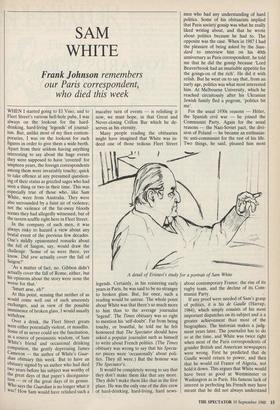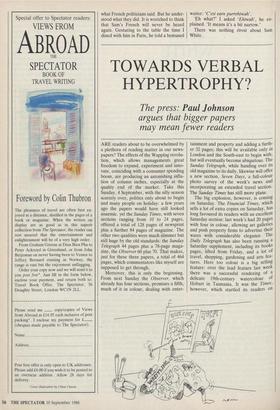SAM WHITE
Frank Johnson remembers
our Paris correspondent, who died this week
WHEN I started going to El Vino, and to Fleet Street's various hell-hole pubs, I was always on the lookout for the hard- drinking, hard-living 'legends' of journal- ism. But, unlike most of my then contem- poraries, I was on the lookout for such figures in order to give them a wide berth. Apart from their seldom having anything interesting to say about the huge events they were supposed to have 'covered' for umpteen years, the foreign correspondents among them were invariably touchy; quick to take offence at any presumed question- ing of their status as grizzled sages who had seen a thing or two in their time. This was especially true of those who, like Sam White, were from Australia. They were also surrounded by a faint air of violence; not the violence of the far-away bloody scenes they had allegedly witnessed, but of the tavern scuffle right here in Fleet Street. In the company of such men, it was always risky to hazard a view about any brutal event of the previous few decades. One's mildly opinionated remarks about the fall of Saigon, say, would draw the challenge: 'Some of us were there, yer know. Did yew actually cover the fall of Saigon?'
'As a matter of fact, no. Gibbon didn't actually cover the fall of Rome, either, but his opinions about the story were none the worse for that.'
`Smart arse, eh?'
At this point, sensing that neither of us would come well out of such unseemly exchanges, and in view of the possible imminence of broken glass, I would usually withdraw.
Over a drink, the Fleet Street greats were either potentially violent, or maudlin. Some of us never could see the fascination, as a source of pessimistic wisdom, of Sam White's friend and occasional drinking companion, the gently depressing James Cameron — the author of White's Guar- dian obituary this week. But to have an obituary signed by an author who had died two years before his subject was worthy of the great days of that paper's disorganisa- tion — or of the great days of its genius. Who says the Guardian is no longer what it was? How Sam would have relished such a macabre turn of events — is relishing it now, we must hope, in that Great and Never-closing Crillon Bar which he de- serves as his eternity.
Many people reading the obituaries might have imagined that White was in- deed one of those tedious Fleet Street A detail of Eristavi's study for a portrait of Sam White legends. Certainly, in his roistering early years in Paris, he was said to be no stranger to broken glass. But, for once, such a reading would be untrue. The whole point about White was that there's so much more to him than to the average journalist `legend'. The Times obituary was so right to mention his 'self-doubt'. Far from being touchy, or boastful, he told me he felt honoured that The Spectator should have asked a popular journalist such as himself to write about French politics. (The Times obituary was wrong to say that his Specta- tor pieces were 'occasionally' about poli- tics. They all were.) But the honour was The Spectator's.
It would be completely wrong to say that they don't make them like that any more. They didn't make them like that in the first place. He was the only one of the dire crew of hard-drinking, hard-living, hard news- men who had any understanding of hard politics. Some of his obituarists implied that Paris society gossip was what he really liked writing about, and that he wrote about politics because he had to. The opposite was the case. When in 1987 I had the pleasure of being asked by the Stan- dard to interview him on his 40th anniversary as Paris correspondent, he told me that he did the gossip because 'Lord Beaverbrook had an insatiable appetite for the goings-on of the rich'. He did it with relish. But he went on to say that, from an early age, politics was what most interested him. At Melbourne University, which he reached circuitously after his Ukranian Jewish family fled a pogrom, 'politics bit me'.
For the usual 1930s reasons — Hitler, the Spanish civil war — he joined the Communist Party. Again for the usual reasons — the Nazi-Soviet pact, the divi- sion of Poland — he became an enthusias- tic anti-communist for the rest of his life. Two things, he said, pleased him most about contemporary France: the rise of its rugby team, and the decline of its Com- munist Party. If any proof were needed of Sam's grasp of politics, it is his de Gaulle (Harrap, 1984), which simply consists of his most important dispatches on its subject and is a greater achievement than most of the biographies. The historian makes a judg- ment years later. The journalist has to do so at the time, and White was twice right when most of the Paris correspondents of grander British and American newspapers were wrong. First he predicted that de Gaulle would return to power, and then that he would rid France of Algeria, not hold it down. This argues that White would have been as good at Westminster or Washington as in Paris. His famous lack of interest in perfecting his French may have meant that he did not always understand what French politicians said. But he under- stood what they did. It is wretched to think that Sam's French will never be heard again. Gesturing to the table the time I dined with him in Paris, he told a bemused waiter: 'C'est earn purrehtwah'.
`Eh what?' I asked Thtwah', he ex- plained. 'It means it's a bit narrow.'
There was nothing etroit about Sam White.























































 Previous page
Previous page